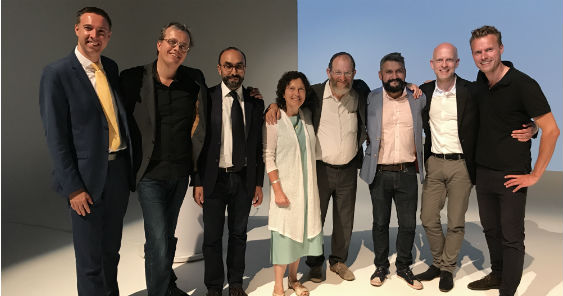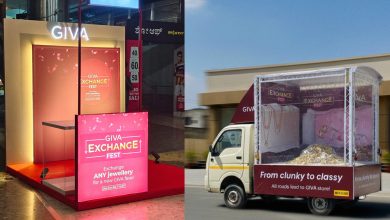#MakeFriends Across Religions, the latest project by Havas Lemz Strategy Director Mark Woerde, his team and Letsheal.org is now global news. The social campaign is built on pure advertising skills and seen as an unprecedented direct marketing effort.

Havas Lemz Strategy Director Mark Woerde
*Main image: Havas Lemz Strategy team with Mark Woerde
Interview credits: Gijs de Swarte
The acclaimed ‘Sweetie’ project was the work of adman Woerde and Letsheal.org. With the help of a digitally engineered Philippine girl, Webcam Child Sex Tourism was exposed all over the world. A social campaign that was covered from CNN to Al Jazeera and back, won a Grand Prix in Cannes along with many other prestigious advertising awards. In the current campaign, the worlds most influential religious leaders – from Pope Francis to The Dalai Lama – released a joint appeal on video calling on the people of the world, to unify, and make friends across religions. Patriarch Bartholomew asks us to ‘recognize the beauty of God in every living human being’. Pope Francis and Rabbi Skorka demonstrate how their religious life has been enriched by their personal friendship. H.H. The Dalai Lama explains the importance of inter-religious friendship. Grand Mufti Shawki Allam stresses not to focus on differences between religious groups. Ayatollah Al-Milani advises to make friends with followers of all religions. Rabbi Jonathan Sacks says: ‘One of the wonderful things about spending time with people completely unlike you is that you discover how much you have in common. The same fears, hopes and concerns.’ The Archbishop of Canterbury is univocal when he tells us: ‘It’s not complicated, start with sharing what we all share, which is the pleasure of conversation.’
How did you come up with the idea?
Mark Woerde: ‘Let me first say that we have transferred the project to our partner The Elijah Interfaith Institute as the aim was always to hand over this initiative post press conference. The Interfaith Institute seeks to promote understanding among the different religions worldwide and without them this would not have been possible. And it is not about us, the important people are the religious leaders themselves and the message they collectively send out to the world.’
Ok. Before we arrive at – how do you produce something like this? How did you come up with the idea?
‘I was a keynote speaker at the Most Contagious event in London sharing insight into the ‘Sweetie’ project. Afterwards I was chatting with some young English advertising guys. One of them, Mirage Islam said: ‘I feel there is a major problem in our society. I feel that when people see me, they assume and believe I am a threat to them. Mainly because of how I look. I’m a Muslim and people who don’t know me are genuinely scared of me.’ I thought – is this for real? I had never thought of that at all. We talked on and it became clear that he and his friends experience things on a daily basis that are possibly based on assumptions on what other people think about them. And a little later I thought this could be one of humanity’s major problems. If we have prejudices about people we don’t know, then what do other people think about us… there is no end to it.
The question is whether those assumptions are correct.
‘We asked market research firm Motivaction to conduct global research on this. With Professor Reichberg of the Peace Research Institute Oslo, we came up with: ‘The wrong interpretation of what others think of your faith leads to social tension, aggression and even worse.’ The research completely confirmed that. But it also turned out that only one in ten people are not open to people with another faith. The vast majority even has a positive attitude towards other religions – and wants to know more about it. That is quite something.’
What in your view is the meaning of this then?
‘To me it is a very positive notion. It shows that even though there may be misunderstanding amongst people, such misunderstandings can be eliminated. We simply had to think of a way of conveying a powerful message to a multi-faith audience‘
And how from there to the Make Friends campaign?
‘My question was, what is the cause of the misunderstanding and what can we do to counter this to get rid of it in our world? We also investigated that – and established the lack of contact between people of different faiths is the main cause. So it is about communication – my profession. From there it was not so hard to get to the ‘make friends across religions’ concept and the idea to ask the religious leaders for their help.’
An impossible plan, most people must have said.
‘I knew it would be very difficult but not insurmountable, getting the worlds most prominent religious leaders to send out such a message hadn’t been done before. A nice challenge to have…But fortunately as we’ve embarked on this secretly, not many people have had the opportunity to express any kind of concern or tell us it was impossible to achieve.’
Your agency Lemz has recently been taken over by Havas. Did the Havas management know about it?
‘Before we became Havas Lemz we had been working on this for a long time. But there was a lot of uncertainty around the project, we were also unsure if all the leaders would participate. So we decided to only inform the board of directors – with little detail and possibly being a little vague too. We said we are working on something and it is more or less about such and such and probably not going to happen anyway. Fortunately the end result has been very well received by the group.’
How do you implement a secret pro bono campaign within a hierarchically regulated agency?
‘Lemz was a success in itself and also works well within Havas. That gave us a certain amount of freedom.’
You say ‘we’. Who are we’?
‘It is impossible to do something like this on your own. Within Havas Lemz the team comprised of Zone Manager Dennis van Aalst, Creative Director Bram Tervoort and Strategist Ali Marmaduke. Outside the agency we were assisted by Rabbi Dr. Alon Goshen-Gottstein of the Elijah Interfaith Institute and a number of partners such as Motivaction, Red Button and Time Star Media.’
To what extent has advertising experience been important in this campaign?
‘We could not have done it without it. It actually began as an extensive, very personal direct marketing campaign. We started out with market research; who are the religious leaders, what do they stand for, what’s their influence, what are their preferences? Then – how do you reach them and what is the message? Just like in direct marketing the key was – the more personal the message the more effective, and tell the truth and do it as well as possible. It all had to be done very precisely because we were not just asking them anything. We were asking them to make a joint statement about a very difficult topic, especially from a theological perspective.’
How does one convince a religious world leader?
‘It’s starts with sending a letter and expecting a rejection within three months. After which you will send another letter and will receive another letter after three months stating that you can expect a letter in three months to state whether or not your request will be considered. And so the cycle continues. Our letters had to be written very precisely, based on the specific challenges faced within the different religions. And they had to coincide with an influencing campaign aimed at the immediate environment of each religious leader. We also approached all the contacts/network we had knowledge of, whom were connected to that particular religious leader, introducing ourselves and stating what our intentions were. An advantage was that as a potential unknown in their world granting cooperation to me had no extra religious or political meaning. However, in that case of the Vatican, it turned out we had two key advantages to being granted access – Letsheal.org and Sweetie – they were well known and Sweetie was a project that Pope Francis was personally aware of!’
And if one is willing, the others are more inclined to cooperate as well?
‘Yes, and also very much a matter of persistence and being there at the right time…We are in Rome, have given up and are already on our way to the airport. Rabbi Skorka, a good friend of the Pope, calls us to let us know that we should wait a while longer. Back to the hotel. Waiting. More waiting. Two days later, at night, I notice that my Whatsapp message has been read. Message on my phone the next morning: ‘Come to the Vatican now.’ We pass security; huge hall, huge crowd of people… take our places in the back… keep quiet… The event ends and the Pope makes a gesture with his hand. We walk up to him and he says: ‘I know about the Sweetie action. Very well done. We can have talk in that room over there. “
Another adventure please. The security and screening must have been quite an obstacle.
‘If you travel often in Israel and then subsequently make a lot of phone-calls with important people in the Islamic world, you can expect a few red flags to pop up. At one stage my phone was turned on remotely and when I looked into the camera photos were automatically taken. After that ‘they’ were listening in to all calls for some weeks.’
Frightening?
‘I talked to several security experts about it and they said, don’t do anything, it will stop in a while – and that turned out to be the case.”
About the message – the – for many believers so important scriptures often are not open at all to other religions.
‘I very much go along with Rabbi Dr. Alon Goshen-Gottstein of the Elijah Interfaith Institute. He says: ‘… when the world’s most important leaders call for friendship, they are in fact affirming a particular way of practicing religion and rejecting another.”
What about the non-believers? Not everyone is equally happy with the institutionalized religions.
‘I’m aware of that. But according to the American Pew Research Center more than 84 percent of the world’s population is religious. So – from an advertising perspective, I cannot think of better, more influential people for this message.’
Lemz has become a success not so much by talking to consumers about a brand but making it possible to have a memorable experience with it. How is that reflected in this campaign?
‘We hope that as many people as possible notice the message, feel supported and maybe even get started. It is not only about spreading #MakeFriends through social media but also doing something about it in real life. There is a website and the channel www.youtube.com/MakeFriends contains the message, background information and all in-depth interviews in many languages. Furthermore we ask local religious leaders to convey the message and put it into practice. For that we have developed a tool kit that can be downloaded from www.elijah-interfaith.org <http://www.elijah-interfaith.org/.’
Do you think this works?
‘I hope so with all my heart. It is all a matter of growing awareness. With this project many people hopefully will come to realize that ‘the other’ is not so different at all. We have more in common than differences. To me that seems an essential insight, right now. ”
* Campaign Credits:
Motivaction International: research
Peace Research Institute Oslo (PRIO): research Alchemiya Media (Mirage Islam & Navid Akhtar): Research
Red Button Digital: Website Production
Time Star Media: live streaming services
Tindemans Translations: translations
3rd Eye Productions: Editing
Martijn Bal: dtp
Sunbeam Studios: Location








